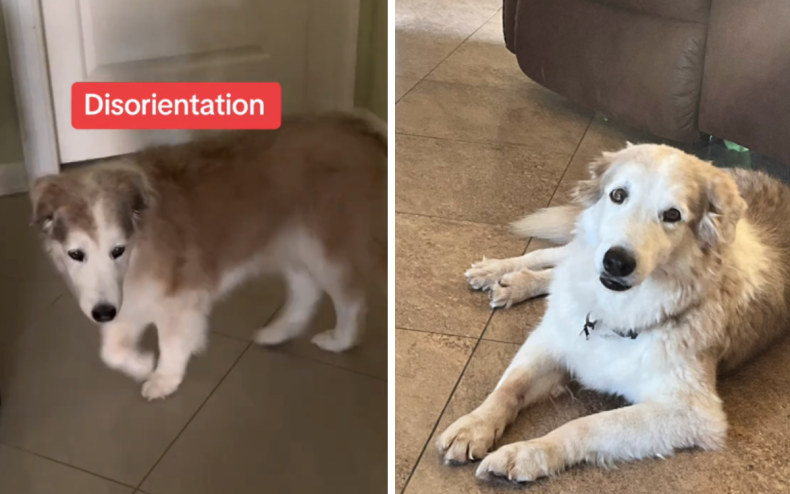A pet owner has offered a heartbreaking glimpse of what it looks like when a dog has dementia.
Idalia Garza from Harlingen, Texas, took to TikTok, posting under the handle idaliagarza09, to showcase the devastating impact dementia had on her dog Sasha.
Sasha first came into Garza's life as a puppy back in 2007. "Her mom and siblings were living under the office where my husband worked," Garza told Newsweek. "One day they found the mom had been run over by a car and died, so he and his co workers took the puppies and each kept one. We kept Sasha."
Garza's family have always loved dogs, with Sasha being one of five canines in the house. But Sasha was extra special. "She was always the sweetest girl of all, everybody loved Sasha," Garza said. "She was the mom and the pack leader...when I fed them all the other dogs would wait until Sasha was done eating before they would start. That's something they did on their own. I never trained them to do that."
But in 2022, Sasha started behaving differently. "One of my German shepherds passed from an age-related illness and we noticed a change in Sasha," Garza said. "She didn't want to play with the other dogs and was always in bed. She would only go out to do the business and come back. Then early this year she started pacing a lot and panting. She would stare at the walls so we took her to the vet."

The diagnosis was a devastating one: Sasha's symptoms matched those of canine cognitive dysfunction syndrome (CCDS) otherwise known as dog dementia. Sadly, CCDS is an all too common diagnosis among aging. A 2001 study published in the Journal of American Veterinary Medical Association identified the prevalence of CCDS in 11-12 year old dogs was around 28 percent, rising to 68 percent in 15-16 year old dogs.
A 2009 research paper published in the Journal of Small Animal Practice suggested the symptoms can start even earlier, with 22.6 percent of dogs 9 or older found to display some form of cognitive impairment.
Though there is no cure for CCDS, steps can be taken to slow its advancement and improve a canine's quality of life. Adjustments to the home can help but changing up a dog's diet and introducing supplements designed to boost brain health are also important.
"My advice is to give your dog supplements," Garza said. "I regret not doing it earlier since I didn't know dogs get dementia. It was very painful to see Sasha like this." Garza hopes the video she put together showcasing some of Sasha's symptoms will help "create awareness" around the condition and help other dog owners spot the signs early.
Titled: "This is what dementia in dog's looks like," the clip shows how Sasha would sleep most of the time, forget to eat, pace in circles, get stuck not knowing how to walk backwards, and suffer from general disorientation. "It's heartbreaking," Garza wrote at the end of the clip.
Other symptoms include loss of toilet training and failure to adhere to commands, according to veterinary charity the People's Dispensary for Sick Animals (PDSA). Canines can also be more vocal than usual.
Garza was left "devastated" by the impact CCDS had on Sasha and the impossible position it left her in. "I was told the best thing was for her to be put down but I couldn't," she said. "She was still recognizing us and doing things, just not as much as before."
She tried everything to slow the progress of Sasha's CCDS down but despite her best efforts, her beloved dog was deteriorating right in front of her eyes. "I'm a stay home mom so I was with her all the time I started hand feeding her," Garza said. "She didn't even want to drink water, she would stay up all night , she would walk and stumble against the furniture. It was heartbreaking to see her like that."
Consulting a vet again, Garza was told that Sasha's refusal to eat or drink was her way of preparing her body to shut down. She felt helpless and utterly heartbroken. "I was so devastated I felt I was letting my baby girl starve to death," Garza said. "I would lay down with her and I would cry all night, she would just look at me with her beautiful eyes."
Those beautiful eyes closed for the final time on August 28, as Sasha crossed the rainbow bridge while lying in the arms of Garza and the rest of her family. "We started singing 'You Are My Sunshine,'" Garza said. "Because since she was a puppy I would sing that to her. Even now, I can't stop crying. I miss my girl so much."
For 16 years, Sasha was an important part of Garza's family. She now hopes that in death her story will help other dogs to avoid the same fate. That hope appears to be becoming a reality too with the clip chronicling Sasha's symptoms racking up 1.9 million views. Though Sasha may be gone, her legacy lives on.
Do you have funny and adorable videos or pictures of your pet you want to share? Send them to life@newsweek.com with some details about your best friend, and they could appear in our Pet of the Week lineup.








